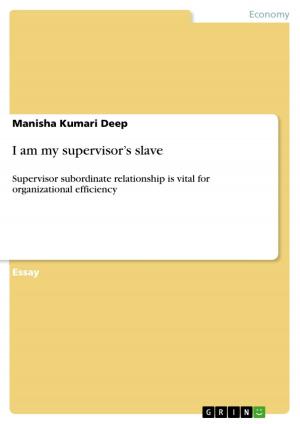About 'The Rising: Ballad of Mangal Pandey' - Narrating the Nation?
Narrating the Nation?
Fiction & Literature, Literary Theory & Criticism, British| Author: | Anna Maria Rain | ISBN: | 9783638071826 |
| Publisher: | GRIN Publishing | Publication: | July 1, 2008 |
| Imprint: | GRIN Publishing | Language: | English |
| Author: | Anna Maria Rain |
| ISBN: | 9783638071826 |
| Publisher: | GRIN Publishing |
| Publication: | July 1, 2008 |
| Imprint: | GRIN Publishing |
| Language: | English |
Seminar paper from the year 2007 in the subject English Language and Literature Studies - Literature, grade: 1,0, University of Constance (Fachbereich Anglistik und Amerikanistik ), course: Bollywood, 21 entries in the bibliography, language: English, abstract: 1.Introduction The Rising: Ballad of Mangal Pandey tells the story of the sepoy Mangal Pandey who triggers what the film calls the 'first Indian War of Independence' in 1857. Embedded in a story about the friendship between Mangal and William Gordon, his English superior, The Rising, I would claim, sets out to create nothing less than a myth of birth of the modern Indian nation - the mainstream Hindi film (Bollywood) is, after all, 'society's biggest and most influential mythmaker'. The Rising moves beyond the themes of generational / social class / gender conflicts of Indian popular cinema that are dealt with ad nauseam, but remains true to its 'origins' as regards the characterisation of its protagonists. It touches on questions of imperialism, colonialism and identity as well as, on a narrower level, friendship and morale. This paper will try to analyse the mechanisms upon which the construction of meaning within the film as well as the narrative of nation and nationalism rests - the assumed meaning being deciphered in another step -, concluding that the film moves in a space in-between nationalist ideas (and ideals) and a post-colonial struggle to de-colonise and 'Indianize'3 the history and culture of the nation by creating a unifying, i.e., inclusive and exclusive myth of the activist (Indian) individual. The portrayal of characters of Indians and English is therefore paramount. To what extent the above aim is achievable by means of popular and traditionally colourful filmmaking is a different question that can only speculated about.
Seminar paper from the year 2007 in the subject English Language and Literature Studies - Literature, grade: 1,0, University of Constance (Fachbereich Anglistik und Amerikanistik ), course: Bollywood, 21 entries in the bibliography, language: English, abstract: 1.Introduction The Rising: Ballad of Mangal Pandey tells the story of the sepoy Mangal Pandey who triggers what the film calls the 'first Indian War of Independence' in 1857. Embedded in a story about the friendship between Mangal and William Gordon, his English superior, The Rising, I would claim, sets out to create nothing less than a myth of birth of the modern Indian nation - the mainstream Hindi film (Bollywood) is, after all, 'society's biggest and most influential mythmaker'. The Rising moves beyond the themes of generational / social class / gender conflicts of Indian popular cinema that are dealt with ad nauseam, but remains true to its 'origins' as regards the characterisation of its protagonists. It touches on questions of imperialism, colonialism and identity as well as, on a narrower level, friendship and morale. This paper will try to analyse the mechanisms upon which the construction of meaning within the film as well as the narrative of nation and nationalism rests - the assumed meaning being deciphered in another step -, concluding that the film moves in a space in-between nationalist ideas (and ideals) and a post-colonial struggle to de-colonise and 'Indianize'3 the history and culture of the nation by creating a unifying, i.e., inclusive and exclusive myth of the activist (Indian) individual. The portrayal of characters of Indians and English is therefore paramount. To what extent the above aim is achievable by means of popular and traditionally colourful filmmaking is a different question that can only speculated about.















